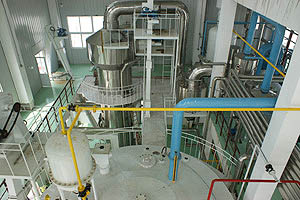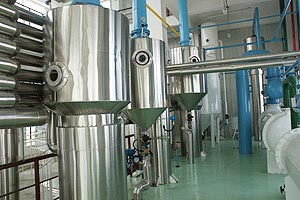- Pretreatment Section of the Oil Mill Plant
- Pressing Section for Oil Mill Plant
- Solvent Extraction Plant
- Oil Refining Plant
- Filling Section of the Oil Mill Plant
- Oil Modification Plant
- Seed Processing Plant
- Small Oil Production Line
- oil press
- YZS-30 Sesame Oil Pressing Machine
- YZS-68 Soya Oil Press
- YZS-80 Canola Oil Press
- YZS-95 Sunflower Seed Oil Press
- YZS-100 Oil Expeller Press
- YZS-120 Oil Pressing Machinery
- YZS-130 Screw Oil Press
- YZS-160 Oil Seed Press
- YZS-80A Combined Oil Press
- YZS-95A Automatic Oil Press Machine
- YZS-100A Automatic Oil Expeller
- Steel Silo
- Face Mask
- Oil Production Process 5S Groundnut
- Physical Refining Process Of The Edible Oil Refining Machine
- Cottonseed Oil Processing Equipment
- Something About Sunflower Oil Extraction Machine
- Something About Soybean Oil Refining Machine
- Something About Edible Oil Solvent Extraction
- Rice Bran Oil Extraction Equipment
- Soybean Oil Refining Equipment
Solvent Extraction Plant
Solvent Extraction Plant
Solvent extraction is a process to extract the oil from oil bearing materials by means of a solvent. A typical solvent used is hexane, a by-product of petroleum. The solvent extraction plant is designed to extract oil directly from oil seeds containing less than 20% oil, like soybeans, after flaking. Or it extracts oils from pre-pressed or fully pressed cake of seeds containing more than 20% oil like sunflowers, peanuts, cotton seed, palm kernels, canola, copra, castor and a variety of other materials. The purpose of solvent plant extraction is to remove most of the oil contained in the seed. Extraction is conducted on prepared seeds or, as generally occurs in the case of high oil content seeds, the cake obtained from pre-pressing. Solvent extraction consists of a sequence of five operations:
- Preparation of seeds for extraction which includes pre-pressing for high oil content seeds.
- Extraction of oil from the prepared material with the aid of a food-grade solvent.
- Desolventising-toasting of the de-oiled seed/meal, often combined with drying and cooling of the said meal.
- Distillation, to remove the solvent from the extracted oil.
- Recovery of solvent, which is reused again and again at the extractor level.
Solvent Extraction Plant Workshop


Solvent Extraction Technology
- Simple in structure with stable performance;
- Additional horizontal grid plate prevents the miscella from flowing back into the material cell to ensure the best extraction effect;
- The wet meal is discharged by the material discharger which continuously discharges the wet meal onto the wet meal conveyor. This avoids meal bridging, un-uniform wet meal discharging and extends the serviceable life of the wet meal conveyor.
- Composed of pre-extraction, extraction and draining sections. There is material turnover in the process of extraction to make the extraction uniform and thorough. Special self-cell solvent spraying ensures the best effect during extraction.
Features of the Solvent Extraction Process
- Evaporation takes place in a vacuum for the best oil quality.
- Extraction system can process different raw materials.
- Developed by BMC, solvent recovery system from vent gas is particularly absorbent.
- With full energy conservation and repeat utilization, steam consumption is markedly reduced.
Solvent Extraction Plants Supplied by KMEC
In order to meet different clients’ requirements, we have a wide range of equipment with capacities from 300 kg to 100 metric tons. When refined, oil grades may qualify as Grade 1, Grade 2, Grade 3 or Grade 4. There are two technologies: one is batch, the other is continuous. Normally we adopt batch-type processing for capacities less than 20 t/d. Otherwise the process adopted is semi-continuous or continuous.
We continue to research new equipment. KMEC develops equipment designed to be fully automatic, utilizing advanced technology that can be combined according to different clients’ requirements. The latest refining equipment consists of many single units and has a self-contained heating system which saves energy since it does not use a boiler. This equipment requires a smaller workspace and costs less. Furthermore, it has a wider range of functions and can be used to produce Grade 1, Grade 2, Grade 3 and Grade 4 oil.








